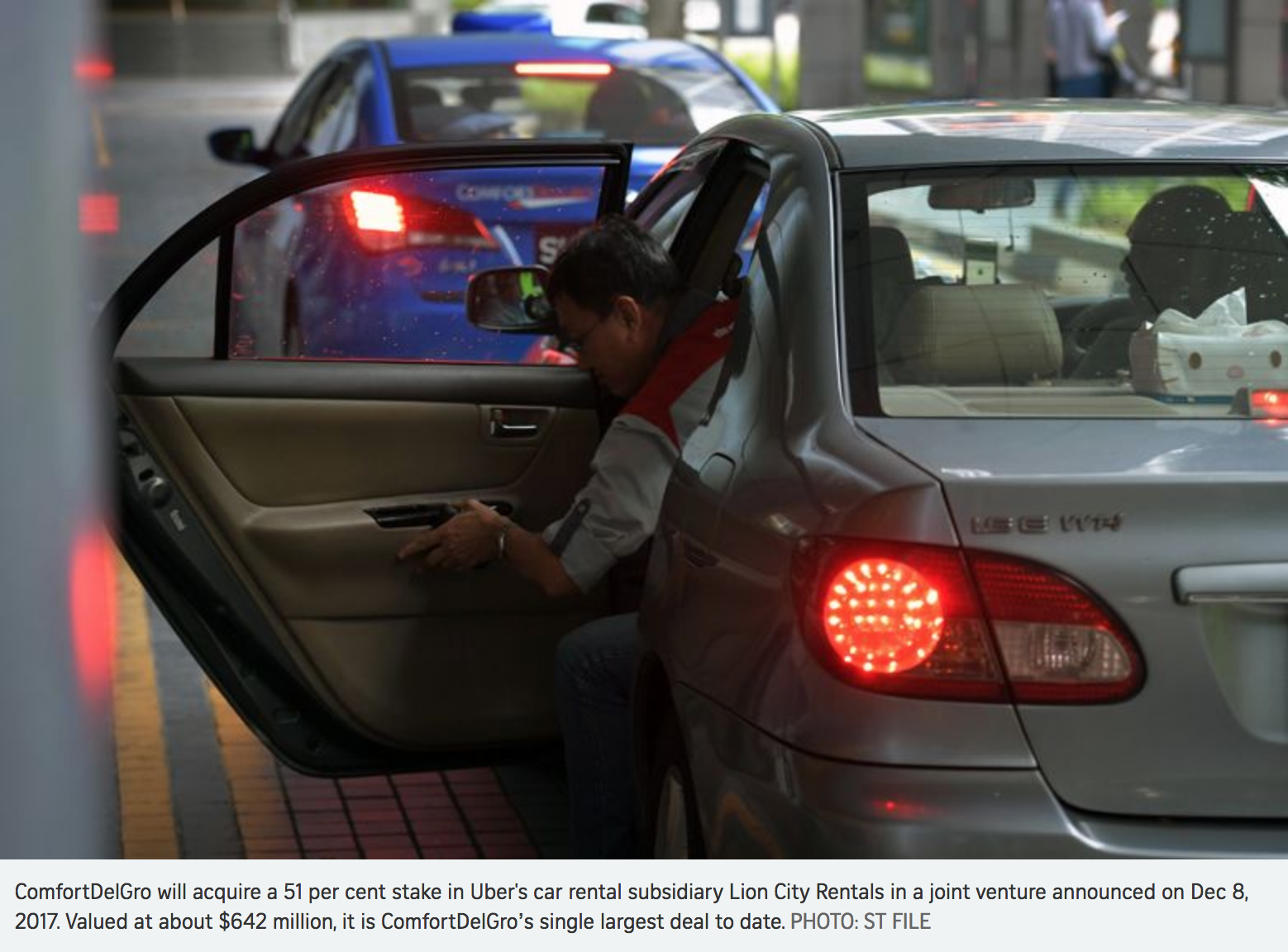Posted on December 08, 2017.

SINGAPORE – Taxi giant ComfortDelGro announced on Friday (Dec 8) its intention to acquire a majority 51 per cent stake in the Uber-owned rental car business, Lion City Holdings.
This news come more than three months after a possible alliance with Uber was first announced in August (2017), ending speculation about the nature of the deal.
Lion City Holdings operates Lion City Rentals, which has a fleet of about 14,000 vehicles, that accounts for the bulk of Uber’s supply of cars in Singapore. Uber will retain the remaining 49 per cent in Lion City Holdings.
With the joint venture, ComfortDelGro’s taxis and Lion City Rental’s private-hire cars will come under a centralised fleet management system, which will handle the dispatching of vehicles to customers.
ComfortDelGro said its cabbies will have an increased earning potential, as they will be able to receive ride requests through the Uber driver app. Uber drivers can likewise get bookings from ComfortDelGro’s customers. More details will be announced later.
ComfortDelGro said in a statement that the deal, which is subject to regulatory approval, is valued at about $642 million, with a cash consideration of $295 million.
It ranks as ComfortDelGro’s single largest deal to-date, said the firm, topping the $203.7 million to buy out the remaining 49 per cent stake in its Australian venture, ComfortDelGro Cabcharge earlier this year (2017).
ComfortDelGro chief executive Yang Ban Seng called the partnership a “win-win”.
“Uber will benefit from our fleet maintenance and management capabilities while we will benefit from Uber’s world class technology. At the same time, consumers will have even more choice with either taxis or private hire vehicles, shorter waiting times and greater reliability,” Mr Yang said.
Singapore Management University Associate Professor Terence Fan, who specialises in transport, called ComfortDelGro’s acquisition of a majority stake in Lion City Holdings a “shrewd move”, as it now has more control in how Uber will grow in Singapore.
Prof Fan said this can help ComfortDelGro stem the loss of revenue from its taxi rentals, which has come under stiff competition from the private-hire car sector.
ComfortDelGro’s taxi fleet has shrunk by more than 14 per cent. As of October this year, it had 14,306 cabs across its Comfort and CityCab brands, down from 16,722 cabs in the same time last year.
Assistant Professor Yang Nan, of the National University of Singapore Business School’s strategy and policy department, said the alliance will help ComfortDelGro and Uber compete against rival Grab, which itself has partnered the other five taxi companies.
In the past months, Grab has also been aggressively wooing ComfortDelGro’s taxi drivers to join them, by dangling guaranteed fare earnings and rental rebates.
Prof Yang said the point-to-point, on-demand transport industry is moving to a duopoly with two major consortium, Grab with its partners and Uber with ComfortDelGro.
“Regulators should be cautious in approving this and further acquisition deals. When the market consolidates, the firms’ power in pricing generally increases, which often hurts consumers and drivers,” he added.
Mr Li Jianggan, founder of Singapore-based Momentum Works, a tech investment company, said the implementation of a licensing regime in July (2017) for the private-hire car industry meant that new drivers are harder to come by. By adding ComfortDelGro’s taxis, Uber increases its supply on the roads.
“ComfortDelGro is also more experienced than Uber in the running and maintaining of assets over its life-cycle,” Mr Li added.
Ms Ruby Chan, 43, a Comfort relief driver, said being able to take Uber bookings can help increase business. “But we do not know yet how much levy Uber will take from such jobs or whether the fares will be lower,” Ms Chan said.
ComfortDelGro’s share price closed at $1.94 on Thursday (Dec 7) and fell three cents to $1.91 on Friday (Dec 8), before the company made the announcement.
The stock has lost about 11 per cent since announcing that it was in talks with Uber in August. Bloomberg said that was due to investors losing patience over the lack of details.
Adrian Lim – Transport Correspondent
